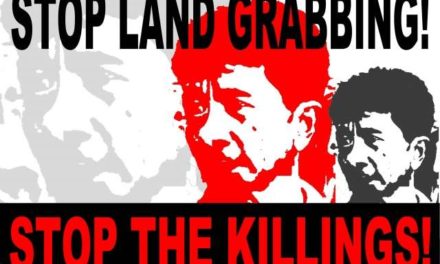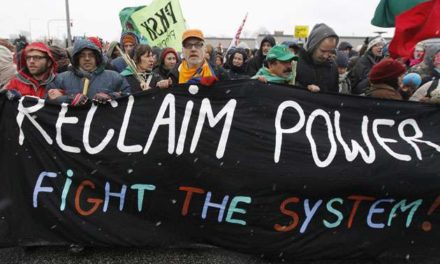An interview with Sheik Jawad Khalisi of the Iraqi National Foundation Congress by Herbert Docena
ON MARCH 19 LAST YEAR, the eve of the first anniversary of the invasion of Iraq , thousands of Shia Iraqis marched down from their mosque in Khadamiya district in Baghdad , passed a US military base, and crossed the Tigris river. There they met thousands of Sunni Iraqis who had marched from their own mosque in another district to join them.
The show of unity was organized by groups behind the Iraqi National Foundation Congress (INFC), a broad coalition of Iraqi political forces, which some see as a possible nucleus for the emergence of a united front against the occupation. Founded in May 2004, the INFC is an umbrella group that includes leftists, nationalists, and Islamists from various tendencies who opposed Saddam’s regime and who refused to be part of any US-installed political body. Membership in the Congress is open to all who subscribe to its minimum bases of unity: an unequivocal call for the withdrawal of occupation troops and opposition to any possible division of Iraq ‘s territory and people on religious or sectarian basis.
Its members include Dr Muthana Harith al Dhari from the Association of Muslim Scholars, Iraq ‘s largest network of Sunni clerics, Najaf-based Shia religious leader Ayatollah Ahmad al Baghdadi, and Wamid Nadhmi, an academic at the Baghdad University who is the group’s spokesman. The al-Sadr movement has a representative in the general secretariat.
Conscious of the occupiers’ strategy of fomenting sectarian strife, the INFC is a deliberate project to bring together Sunni and Shia Muslims, Arabs, Kurds, Turcomen, Assyrians and other minorities. The INFC condemned the US-led offensives against both the mainly Shi’ite city of Najaf and the mainly Sunni city of Fallujah . It has also been instrumental in defusing sectarian tension in highly-charged Kirkuk and Mosul .
Claiming to have no armed wing, the INFC explicitly supports the Iraqis’ right to resist “by all means necessary” even as it has condemned beheadings, hostage-taking, and the killing of non-combatants.
On the sidelines of the recent World Social Forum in Porto Alegre , Brazil , we spoke with Sheik Jawad al-Khalisi, an influential Shia religious scholar and political leader who also serves as the INFC’s secretary-general. The madrasa that he administers, an unassuming complex surrounded by narrow, muddy streets, old houses decked with Arab-style balconies and bazaars, is said to be the historic birthplace of the resistance to the British occupation in the 1920s. It has also now become the venue of the INFC’s regular meetings.
Herbert Docena: Tell us about the Iraqi National Foundation Congress.
Jawad al-Khalisi: After the invasion of Iraq , the occupation forces occupied Iraq militarily, economically, and politically. The Iraqi state has been destroyed. At first, the Iraqi people were shocked. It was necessary to initiate a national project in order to unite all the forces opposed to the occupation. That’s the main reason why we participated in the elaboration of the Foundation Congress. In fact, we have been thinking about this project before the invasion. We planned to transform this project into a reality after the occupation forces came.
HD: You had a founding conference in May 2004. What has happened since then?
JK: Bit by bit, the Congress has become the main force representing the opposition to the occupation. It represents opposition using different forms. We don’t have direct contact with the military group of the resistance but these groups send letters and messages to us. They consider the INFC their political structure and defend the political positions that the resistance groups are fighting for.
To give you an example of the effectiveness and representativity of the Congress, when United Nations special representative Lakhdar Brahimi came to Iraq , he met with many Iraqi forces and he met the INFC because he considers us as the main force representing the opposition in Iraq . Concerning the elections, a call to boycott came from the Congress.
HD: Outside Iraq , we hear of many groups who claim they represent the resistance. What’s your basis for saying you’re the political structure defending the positions of the resistance?
JK: We don’t say that we are the political face of the resistance. Firstly, we are a political structure; we don’t have a military wing. But some resistance groups whom we don’t know of say that the positions expressed by the Congress represent the whole opposition in Iraq – armed and unarmed. Perhaps some other political groups have relations to the resistance but I think our political positions represent the Iraqi national consensus.
HD: What are the Congress’s main political demands?
JK: We have elaborated a political program and everyone who wants to join has to accept the points of the program declaration. First, we demand an immediate retreat of the occupation forces and a complete return of sovereignty to Iraq . Second, we insist on the unity of the Iraqi territory. Third, we support the legitimacy of resisting occupation by any means necessary. Fourth, we refuse any division of the Iraqi people on religious or sectarian basis.
HD: You call for an immediate withdrawal of occupation forces. What do you say to those who argue that the troops should not be withdrawn yet because there will be chaos if the troops leave?
JK: We are also afraid of a political vacuum in Iraq . When we say “immediate retreat of occupation,” we know that this will not happen in one day. But it’s necessary to set a timetable. During the intervening period, the Iraqi police and army can be built up. In any case, we don’t expect things can get much worse when the occupation troops leave Iraq than what’s happening today. What’s happening today is so bad that after the retreat of the occupation forces, the situation could not be worse.
HD: What about those who are saying there will be civil war when the troops leave?
JK: They are trying to legitimise a long occupation by the United States . They are puppets of the Americans.
HD: US officials always say that those who are fighting the occupation forces are “anti-Iraqi” forces” or “Baathist dead-enders” or…
JK: According to the US military, in Fallujah they captured 1,065 people. Among them, they found only 25 non-Iraqis. All the others were Iraqis. The resistance is an Iraqi resistance – a popular resistance — which is spreading now. Among the resistance groups, there are former officers of the army who are using their expertise to help the resistance. But the main ideological current inside the resistance is a popular and moderate Islamic current – not a Baathist one. It is popular, patriotic, and Islamic.
HD: What do you mean by “popular Islamic”?
JK: That means that the people of Iraq – not necessarily the organized ones or those who belong to organized political groups – are fighting the occupation at their own initiative and they generally have a mixture of religious and patriotic motives for doing so. The American forces dominate the Iraqi nation and they also have a project that threatens the religious identity of Iraq . The religious motive is also very strong because people who are fighting militarily superior forces have more strength when they have a religious conviction that they are fighting against oppression and that when they die, they’ll go to heaven.
HD: There are people in the anti-war movement, in the left, and even those in the right who also oppose the occupation but who say that we shouldn’t support the resistance because they’re being led by Baathists and “fundamentalists” and we shouldn’t allow them to take over Iraq if and when the US leaves.
JK: It is the occupation forces who are spreading this line. As one French deputy said a few months ago, the Iraqi resistance was like the French resistance: one day it will defeat the occupation forces and take power in Iraq .
When I say “Islamic current” inside the resistance, I mean a moderate Islamic current. It is not the Islamic current portrayed in the media. It is an Islamic current that is defending it’s own culture and nation but which is not hostile to other cultures and other nations. It is not hostile to the American people but it is opposed to the project of American domination of our region and the world.
HD: To what extent are Saddam loyalists and “Islamic hard-liners” engaged in the resistance?
JK: I think that they represent only 5% to 10% of the resistance. Of this fraction, the “Islamic hard-liners” are the majority. Partisans of Saddam have a very weak participation. However, some Baathists participating in the resistance and in the political opposition to the occupation are not Saddam loyalists. They consider Saddam responsible for what happened. They are still attached to the ideology of the Baath party but they are not Saddam loyalists. They don’t want him to come back to power. Some of them have quit the Baath ideology and they are against the occupation.
Now, the main focus in Iraq is to fight the occupation. This is the fundamental question now – transcending ideological and political differences.
HD: How divided are the resistance groups and what are the chances of forming a united front against the occupation forces?
JK: Iraq ‘s condition under the occupation doesn’t allow for the formation of a united front now. In one area, you will sometimes find six or seven guerrilla groups formed by the population to fight the occupation but that are independent from one another. Sometimes, some problems arise among these groups. After one year and a half of experience, we are witnessing the combination of different groups and we think that this coming together will be reinforced in the coming months.
The operation in Mosul two months ago and the operations last week – when one American helicopter was shot down and 31 soldiers were killed – signifies that we are witnessing qualitative developments in the armed struggle.
HD: Do the resistance groups have the support of ordinary Iraqi people?
JK: The main support to resistance actions is given by ordinary people.
HD: The INFC originally said it would participate in the January 30 elections. However, in the end you decided to boycott. Why?
JK: We said we are going to participate in the election if it were honest and legitimate. We had conditions and we expressed them in documents we sent to the United Nations, the Washington Post, and the New York Times. We hoped that the election commission would take them into account. But, because the commission is not independent, it didn’t.
One of our conditions was a stop to all the military aggression against the Iraqi people. When the Americans attacked Falluja, it was enough for us to refuse any participation in the elections.
HD: But there are those who justify their participation in the elections saying they only took part because it would be the best way to end the occupation.
JK: That’s also our point of view but on the condition that the requirements for real elections exist. Elections in the way that the Americans want them organized serve to support the occupation.
HD: The United Iraqi Alliance, for example, said that when they win, they will call for a timetable of the withdrawal.
JK: The coming days will show whether they will respect their promise.
* Herbert Docena is a research associate at Focus on the Global South, a Bangkok-based policy research and advocacy center. Email: <[email protected]>








